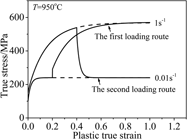Crossref Citations
This article has been cited by the following publications. This list is generated based on data provided by
Crossref.
Quan, Guo-Zheng
Zhang, Zhi-hua
Zhou, Yuting
Wang, Tong
and
Xia, Yu-feng
2016.
Numerical Description of Hot Flow Behaviors at Ti-6Al-2Zr-1Mo-1V Alloy By GA-SVR and Relative Applications.
Materials Research,
Vol. 19,
Issue. 6,
p.
1253.
Lin, Y. C.
Wen, Dong-Xu
Chen, Ming-Song
and
Chen, Xiao-Min
2016.
A novel unified dislocation density-based model for hot deformation behavior of a nickel-based superalloy under dynamic recrystallization conditions.
Applied Physics A,
Vol. 122,
Issue. 9,
Chen, Ming-Song
Lin, Y. C.
Li, Kuo-Kuo
and
Chen, Jian
2016.
The nonlinear unloading behavior of a typical Ni-based superalloy during hot deformation: a unified elasto-viscoplastic constitutive model.
Applied Physics A,
Vol. 122,
Issue. 9,
Lin, Y. C.
Zhao, Chun-Yang
Chen, Ming-Song
and
Chen, Dong-Dong
2016.
A novel constitutive model for hot deformation behaviors of Ti–6Al–4V alloy based on probabilistic method.
Applied Physics A,
Vol. 122,
Issue. 8,
Chen, Ming-Song
Lin, Y. C.
Li, Kuo-Kuo
and
Chen, Jian
2016.
The nonlinear unloading behavior of a typical Ni-based superalloy during hot deformation: a new elasto-viscoplastic constitutive model.
Applied Physics A,
Vol. 122,
Issue. 9,
Lin, Y.C.
Wen, Dong-Xu
Chen, Ming-Song
Liu, Yan-Xing
Chen, Xiao-Min
and
Ma, Xiang
2016.
Improved dislocation density-based models for describing hot deformation behaviors of a Ni-based superalloy.
Journal of Materials Research,
Vol. 31,
Issue. 16,
p.
2415.
Lin, Y.C.
He, Dao-Guang
Chen, Ming-Song
Chen, Xiao-Min
Zhao, Chun-Yang
and
Ma, Xiang
2016.
Study of Flow Softening Mechanisms of a Nickel-Based Superalloy With Δ Phase.
Archives of Metallurgy and Materials,
Vol. 61,
Issue. 3,
p.
1537.
Konovalov, Anatoly V.
Smirnov, Alexander S.
Belozerov, George A.
and
Muizemnek, Olga Yu.
2016.
Simulation of the rheological behavior of the 01570C alloy under high-temperature deformation.
Vol. 1785,
Issue. ,
p.
040028.
Chen, Ming-Song
Yuan, Wu-Quan
Lin, Y.C.
Li, Hong-Bin
and
Zou, Zong-Huai
2017.
Modeling and simulation of dynamic recrystallization behavior for 42CrMo steel by an extended cellular automaton method.
Vacuum,
Vol. 146,
Issue. ,
p.
142.
He, Xu
and
Yao, Yao
2017.
A dislocation density based viscoplastic constitutive model for lead free solder under drop impact.
International Journal of Solids and Structures,
Vol. 120,
Issue. ,
p.
236.
Chen, Ming-Song
Yuan, Wu-Quan
Li, Hong-Bin
and
Zou, Zong-Huai
2017.
Modeling and simulation of dynamic recrystallization behaviors of magnesium alloy AZ31B using cellular automaton method.
Computational Materials Science,
Vol. 136,
Issue. ,
p.
163.
Liu, Yan-Xing
Lin, Y.C.
and
Zhou, Ying
2017.
2D cellular automaton simulation of hot deformation behavior in a Ni-based superalloy under varying thermal-mechanical conditions.
Materials Science and Engineering: A,
Vol. 691,
Issue. ,
p.
88.
Wen, Dong-Xu
Lin, Y.C.
and
Zhou, Ying
2017.
A new dynamic recrystallization kinetics model for a Nb containing Ni-Fe-Cr-base superalloy considering influences of initial δ phase.
Vacuum,
Vol. 141,
Issue. ,
p.
316.
Yadav, Surya Deo
El-Tahawy, Moustafa
Kalácska, Szilvia
Dománková, Mária
Yubero, David Canelo
and
Poletti, Cecilia
2017.
Characterizing dislocation configurations and their evolution during creep of a new 12% Cr steel.
Materials Characterization,
Vol. 134,
Issue. ,
p.
387.
Bobbili, Ravindranadh
Venkata Ramudu, B.
and
Madhu, Vemuri
2017.
A physically-based constitutive model for hot deformation of Ti-10-2-3 alloy.
Journal of Alloys and Compounds,
Vol. 696,
Issue. ,
p.
295.
Lin, Y. C.
Liang, Ying-Jie
Chen, Ming-Song
and
Chen, Xiao-Min
2017.
A comparative study on phenomenon and deep belief network models for hot deformation behavior of an Al–Zn–Mg–Cu alloy.
Applied Physics A,
Vol. 123,
Issue. 1,
Huang, Chang-Qing
Deng, Jie
Wang, Si-Xu
and
Liu, Lei-lei
2017.
A physical-based constitutive model to describe the strain-hardening and dynamic recovery behaviors of 5754 aluminum alloy.
Materials Science and Engineering: A,
Vol. 699,
Issue. ,
p.
106.
Liu, Yang
Geng, Cong
Zhu, Yunke
Peng, Jinfeng
and
Xu, Junrui
2017.
Hot Deformation Behavior and Intrinsic Workability of Carbon Nanotube-Aluminum Reinforced ZA27 Composites.
Journal of Materials Engineering and Performance,
Vol. 26,
Issue. 4,
p.
1967.
Chen, Dong-Dong
Lin, Y.C.
Zhou, Ying
Chen, Ming-Song
and
Wen, Dong-Xu
2017.
Dislocation substructures evolution and an adaptive-network-based fuzzy inference system model for constitutive behavior of a Ni-based superalloy during hot deformation.
Journal of Alloys and Compounds,
Vol. 708,
Issue. ,
p.
938.
Wang, Yanju
Jiang, Jiaying
Jia, Chonglin
Li, Xingwu
and
Guan, Yongjun
2018.
Advances in Materials Processing.
p.
1217.
